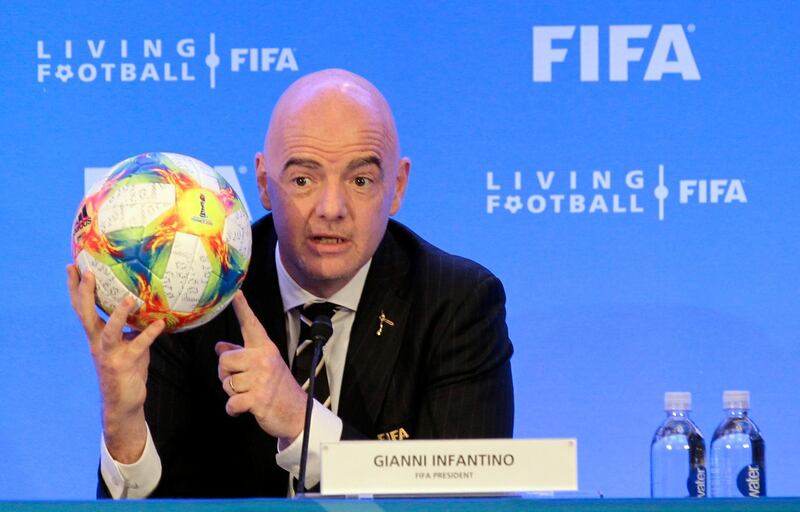Fifa is already facing headwinds with regards to two key decisions taken during its meeting in Miami on Thursday and Friday.
Both decisions concern the expansion of the two biggest competitions organised by football's world governing body – the World Cup and the Club World Cup – and the adjustments its members will have to make as a consequence.
There were breakthroughs in other areas, however, such as the approval of the use of Video Assistant Referees (VAR) at the Women's World Cup this year.
But let's shed some light on the contentious issues.

World Cup 2022
The news: Fifa earlier took a decision to expand the World Cup from 32 teams to 48 when the United States, Canada and Mexico co-host the event in 2026. But last April, Fifa president Gianni Infantino expressed his keenness to bring the expansion plan forward to 2022 when the event will be hosted by Qatar. He said as much in Dubai earlier this year.
The rationale: A study conducted by Fifa concluded that a 48-team tournament would generate an additional US$400 million (Dh1.47 billion) in revenue. This is not surprising as football is the world's most popular sport. Teams from lesser-known countries in Asia and Africa have made considerable progress over the past decade reflecting the economic development under way in these countries. Having a bigger World Cup is Fifa's way of further incentivising these teams to raise their levels.
The problem: Qatar is a small country where infrastructure is still being put in place in order to host the first ever World Cup in the Middle East. Doubts were already being raised about the feasibility of hosting 32 teams, so holding a 48-team event there would seem out of question.
The proposal: According to a New York Times report that came out before the summit got under way, a proposal was made to make one or both of Oman and Kuwait co-hosts – given that the two countries have remained neutral in the ongoing diplomatic rift between the quartet of nations (Bahrain, Saudi Arabia, the UAE and Egypt) and Qatar. The Fifa council, however, has opted to take a final decision on June 6 in Paris. Meanwhile, Fifa and Qatar are expected to jointly submit the names of potential co-hosts to the governing body's congress.
The hurdles: It is now up to Fifa and Qatar to agree on the proposal of co-hosting the 2022 event, as well as on who will serve as co-hosts with the Qataris. The Associated Press has cited unnamed sources in a report saying Fifa will face resistance from Doha.
Stadium infrastructure in Kuwait and Oman is said to be lacking. Kuwait City's Jaber Al Ahmad International Stadium has 60,000 seats but Sabah Al Salem Stadium only 26,000. The venue in Oman identified in a Fifa study seen by AP is the 34,000-capacity Boshar-Sultan Qaboos Sports Complex.

Club World Cup
The news: The Fifa Council agreed to introduce a pilot tournament of an enlarged 24-team Club World Cup in 2021. A quadrennial version would be launched in the summer of 2021 to replace the current Club World Cup, which is a seven-team event played each December. The last two editions, in 2017 and 2018, were held in Abu Dhabi.
The rationale: The move to scrap the current tournament stems from the fact it is largely ignored by European fans. In the existing format, club champions from each continent play each other every year, with the European club champions usually winning the title given that the quality of opposition from the non-European continents is not of the same level as that of theirs.
The Club World Cup in its proposed revised format will fill the slot previously reserved for the Confederations Cup, which traditionally serves as a test event in a host nation a year before the World Cup.
The problems: There are two issues at work.
One is the lack of consultation on the part of Fifa, as alleged by the powers that be in European football. The second is the expected congestion in the football calendar and its many fall-outs, most notably player health and scheduling challenges.
The proposal: In 2021, Fifa envisages the window for international matches – likely to include 2022 World Cup qualifiers – from May 31 to June 8. The Club World Cup would be held from June 17 to July 4, while the African Cup of Nations and Concacaf Gold Cup could be played from July 5-31. European club seasons typically start around mid-August.
According to a Fifa document, South America would have six slots in the first edition. Three each would go to teams from Africa, Asia and Concacaf, which represents North and Central America and the Caribbean. Oceania would get one. The confederations would decide their own qualification process. Winners of the eight three-team groups would advance to the quarter-finals. Teams would play two to five matches over a maximum of 18 days.
The hurdles: How Fifa will get Europe on board will be fascinating to follow.
Uefa, Europe's governing body, the European Club Association, which represents 232 of the continent’s leading sides, and FIFPro, the world players’ union, are said to be unhappy. The competition immediately faced a boycott from Europe's leading clubs, including the likes of Real Madrid and Manchester United.
"Our clubs won't participate in the 2021 edition of the Club World Cup," the ECA said. "We will assess participation in editions after 2024."
The seven European members attending the meeting in Miami voted against Fifa's plans, which they see as threatening the status of the Uefa Champions League.
"Uefa shares the ECA's view that the international match calendar in 2021 does not provide any realistic option to stage a 24-team Club World Cup and that it should furthermore not be played at a time when players should have a well-deserved rest period," Uefa said in a statement.
"Uefa supports the views of its stakeholders and has the duty to protect the health of players."






